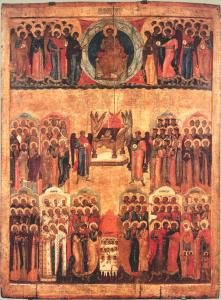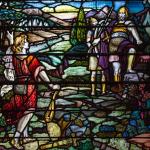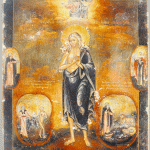
Every year, we look to the fruits of Christ’s labor, the saints, those who, having lived by faith, became holy by grace. We look to them and the great things they have done, and then we honor them. In doing so, we honor God, for their holiness is, in part, the work of God, for God gave them the grace they needed to do wondrous things with their lives. Certainly, they were not perfect. Not everything they did was respectable. But their faith allowed them to open themselves up to God and change for the better throughout their lives. They were open to and cooperated with the grace they needed to become holy. With it they became, as it were, angels, messengers of God, revealing to the world the way of grace, and how grace can perfect those who embrace it with faith, hope and love. We can learn from them, not only by looking at what they have done right, but also, from what they have done wrong, for by doing so, we can be encouraged to do good with our lives but also not to despair when we find ourselves struggling to do what we know is right; that is, through them, we can see how grace can perfect nature in such a way that even our wrongdoing does not have to get in the way of our perfection. This is why it could be said: “The commemoration of the saints, who triumphed over tyrants and became angels, is cause for celebration among the heavenly beings.” [1]
We, as Christians, but also as humans, indeed, as creatures created by God, are called to be one, to realize our unity in love, that is to experience the oneness we will have in the eschatological kingdom of God. Through it, we know we need each other. We are better together, and in our communion with each other, we will realize the full extant of this: “It is also called communion because it makes us have communion with all the saints, so that what is lacking in one may be supplied from the common bounty of all the saints.” [2]
We, therefore, can look to the past and see many who have become saints despite the questionable things they did at some point in their lives because they found themselves drawn beyond themselves by grace and become something more, something better. What better example do we have of this than of Rahab? “By faith Rahab the harlot did not perish with those who were disobedient, because she had given friendly welcome to the spies” (Heb. 11:31 RSV). When the people of Israel came to her for her help, she joined her lot with them, and by doing so, she found herself receiving blessings, blessings which brought her grace, and through that grace, was able to become someone greater, someone who could and would share something of herself into Christ’s lineage. She is not the only one. If we look throughout Jesus’ ancestry, we will find many who have done noble things, many who had great faith, like David and Solomon, and yet if we look closely at them, we will find they also did many great evil things as well. Their evil actions did not terminate their connection with God, even if they might have found their relationship with God faltering from time to time because they had faith, and through that faith, they opened themselves up to grace, letting their faith, not their personal defects, have the last word. If they are capable of such, despite all we can see they have done, we should have hope, no matter what we have done, we can also find ourselves brought into the body of Christ and receive saving, indeed, deifying grace as well.
While we might not be one of the ancestors of Christ, we can be brought into the body of Christ and like them, receive grace after grace. But like them, we must struggle with ourselves, making room for grace, for then we make room for God and allow God to continue to be at work not only in us, but in the world at large. For God can be found in all the good which God’s saints do:
Although God is not localized, nevertheless he walks about locally in his saints (cf. Gen. 3:8), when he is preached by them from place to place. For God, who is not moved in space or time, is moved in space and time in his servants, as often as he is preached by them in any place.[3]
That is, we are all called to becomes saints, to become one of the crowd of witnesses who illuminate the world with God’s grace:
Therefore, since we are surrounded by so great a cloud of witnesses, let us also lay aside every weight, and sin which clings so closely, and let us run with perseverance the race that is set before us, looking to Jesus the pioneer and perfecter of our faith, who for the joy that was set before him endured the cross, despising the shame, and is seated at the right hand of the throne of God (Heb. 12:1-2 RSV).
If we do so, if we let God’s grace transform us from within and make us holy, we will find it does more than purify us from us sins: it will make us temples of God, and in that way, God will dwell in us. But this will only happen if, upon receiving such grace, we do not turn in upon ourselves, and so cut ourselves off from further grace. We need to be constantly open to God and God’s grace, so that we can go from grace to grace, glory to glory, and to do that, we need to become like God, sharing the bounty of what we have with the rest of the world.
[1] Moralia et Ascetica Armeniaca: The Oft-Repeated Discourses. Trans. Abraham Terian (Washington, DC: CUA Press, 2021), 206 [Discourse 13].
[2] St. Albert the Great, On the Body of the Lord. Trans. Sr. Albert Marie Surmanski, OP (Washington, DC: CUA Press, 2017), 269.
[3] St. Isidore of Seville, Sententiae. Trans. Thomas L. Knoebel (New York: Newman Press, 2018),39.
Stay in touch! Like A Little Bit of Nothing on Facebook.
If you liked what you read, please consider sharing it with your friends and family!
N.B.: While I read comments to moderate them, I rarely respond to them. If I don’t respond to your comment directly, don’t assume I am unthankful for it. I appreciate it. But I want readers to feel free to ask questions, and hopefully, dialogue with each other. I have shared what I wanted to say, though some responses will get a brief reply by me, or, if I find it interesting and something I can engage fully, as the foundation for another post. I have had many posts inspired or improved upon thanks to my readers.











